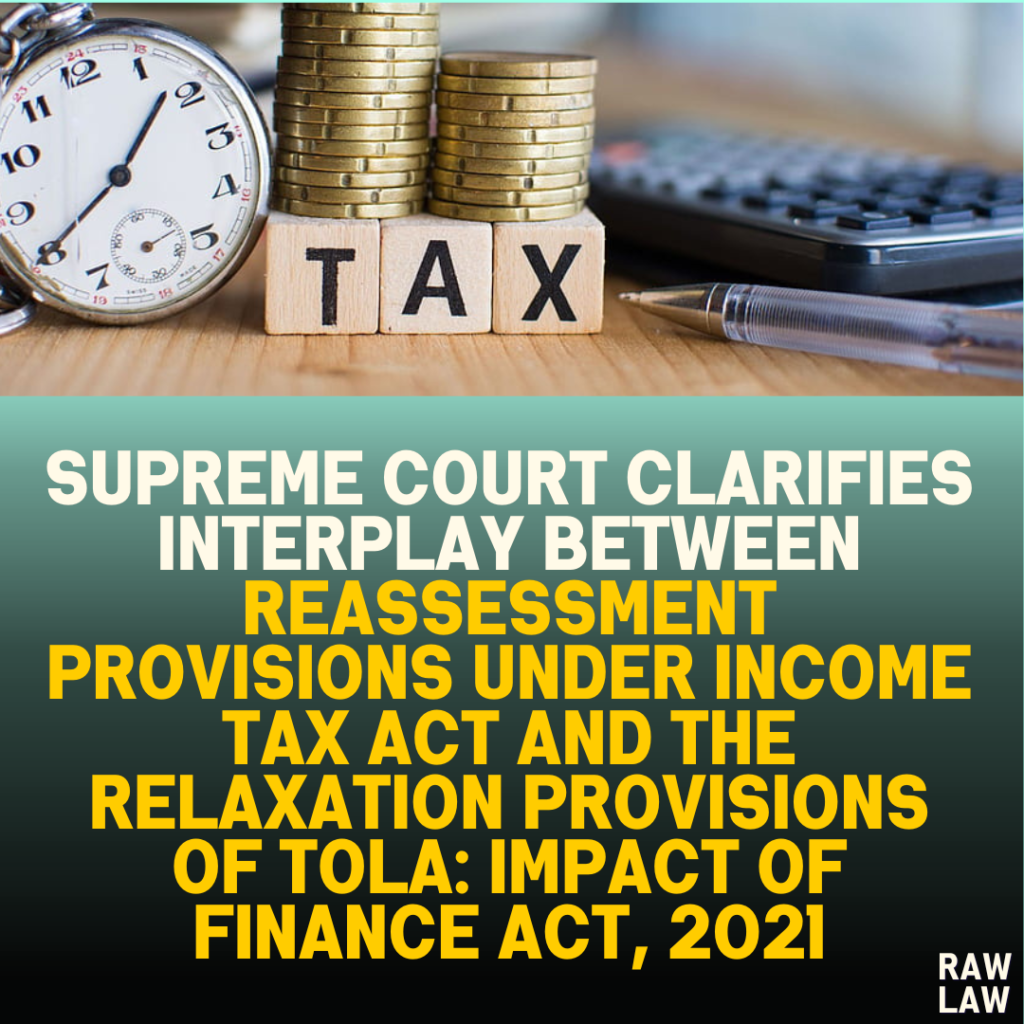Court’s Decision:
The Supreme Court held that the new reassessment provisions introduced by the Finance Act, 2021 would apply prospectively from 1 April 2021. It further ruled that notices issued under the old provisions during the interim period of 1 April 2021 to 30 June 2021, which were saved by the Relaxation Act (TOLA), must be treated under the new reassessment framework. This decision clarified the position on various conflicting interpretations of the amendments and their application to pending reassessment cases.
Facts:
- The present matter involves a batch of appeals revolving around the reassessment provisions under the Income Tax Act, 1961.
- The controversy arose due to the amendments introduced by the Finance Act, 2021, which substantially overhauled the procedure for reopening assessments.
- Before the amendment, the reassessment process was governed by Sections 147 to 151 of the Income Tax Act. Under these provisions, reassessment could be initiated if the Assessing Officer had “reason to believe” that any income had escaped assessment.
- During the COVID-19 pandemic, the government enacted the Taxation and Other Laws (Relaxation and Amendment of Certain Provisions) Act, 2020 (TOLA) to extend the time limits for compliance with various statutory requirements, including reassessment.
- The Finance Act, 2021 introduced a new regime for reassessment with effect from 1 April 2021, which, inter alia, altered the time limits and procedural requirements for issuing reassessment notices.
Issues:
- Whether the reassessment notices issued under the old regime between 1 April 2021 and 30 June 2021, saved by TOLA, would be governed by the old provisions or the new regime introduced by the Finance Act, 2021.
- The applicability of the principle of strict interpretation of statutes to procedural changes in tax legislation.
- The scope of Article 142 of the Constitution in regularizing procedural lapses under the Income Tax Act.
Petitioner’s Arguments:
- It was argued that the notices issued between 1 April 2021 and 30 June 2021 should be treated as valid under the old provisions of the Income Tax Act.
- The petitioner contended that the new regime should only apply to cases where reassessment notices were issued after 1 July 2021, as the Finance Act, 2021 came into effect from 1 April 2021.
- The petitioner relied on the saving clause provided under TOLA, which extended the time limits for issuance of reassessment notices during the pandemic.
Respondent’s Arguments:
- The respondents argued that all reassessment proceedings initiated after 1 April 2021 must comply with the new regime under the Finance Act, 2021.
- They contended that allowing notices issued between 1 April 2021 and 30 June 2021 to be governed by the old regime would create confusion and lead to an arbitrary distinction between reassessments based on the date of notice issuance.
- The respondents highlighted the principle of harmonious construction, suggesting that procedural amendments should be given retrospective effect to ensure uniformity.
Analysis of the Law:
- The court analyzed the interplay between the old reassessment provisions and the new regime introduced by the Finance Act, 2021.
- It referred to the principle of strict interpretation of taxing statutes, which mandates that in case of ambiguity, the benefit should go to the taxpayer.
- The court also discussed the principle of harmonious construction to resolve conflicts between TOLA and the Finance Act, 2021, noting that procedural provisions must be construed in a manner that advances the object and purpose of the amendments.
Precedent Analysis:
- The court referred to its earlier decision in GKN Driveshafts (India) Ltd. v. Income Tax Officer, which laid down the procedure for reassessment under the old regime, including the requirement for the Assessing Officer to provide reasons for reopening and an opportunity of hearing to the taxpayer.
- It also examined the ruling in Ashish Agarwal, where the court allowed reassessment notices issued during the transition period to be treated as show cause notices under the new regime.
Court’s Reasoning:
- The court held that the Finance Act, 2021, which substituted the old regime of reassessment with a new framework, was intended to streamline the reassessment process.
- It reasoned that the legislative intent behind TOLA was to provide temporary relief to taxpayers during the pandemic, and it should not be construed as a permanent saving clause for notices issued during the interim period.
- The court invoked Article 142 of the Constitution to give effect to its decision and provide a uniform treatment to all reassessment cases initiated during the transition period.
Conclusion:
The Supreme Court concluded that reassessment notices issued between 1 April 2021 and 30 June 2021, which were saved by TOLA, must be treated under the new reassessment framework introduced by the Finance Act, 2021. This ruling clarified the position on the applicability of the amended provisions and ensured uniformity in the reassessment process.
Implications:
- The decision will have a significant impact on pending reassessment cases, as all notices issued during the transition period will now be governed by the new regime.
- It will ensure that the reassessment process is consistent and in line with the legislative intent behind the amendments.
- The ruling also underscores the importance of harmonizing conflicting statutory provisions and upholding procedural fairness in tax administration.
